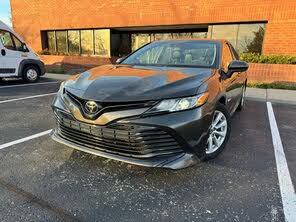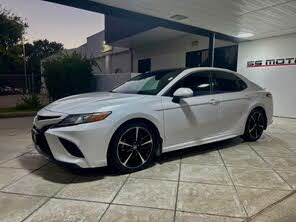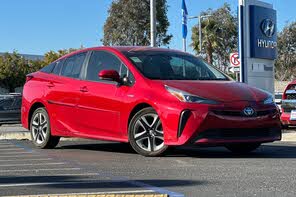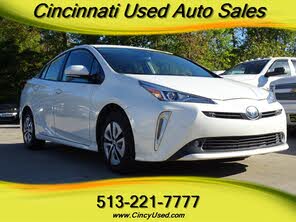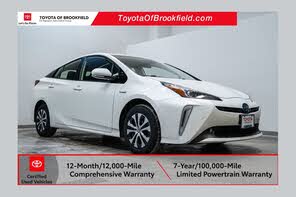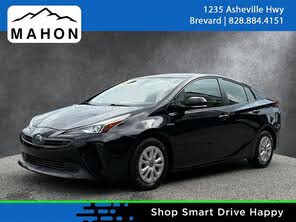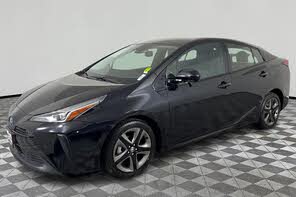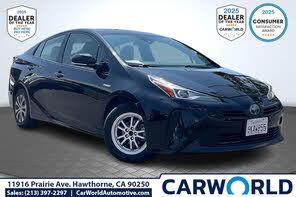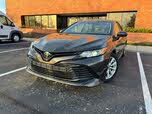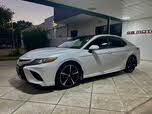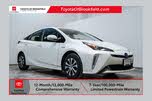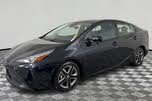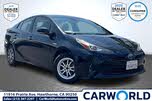2019 Toyota Camry vs 2020 Toyota Prius
Overview | |
MSRP$24,095 | MSRP$24,325 |
Listings1323 | Listings108 |
Ratings & Reviews | |
User Reviews | User Reviews |
Expert reviews7.8 out of 10 | Expert reviews7.5 out of 10 |
Pros
Cons
| Pros
Cons
|
2019 Toyota Camry Reviews SummaryBlame the Toyota Avalon for the Toyota Camry’s flaws. In order to put daylight between itself and Toyota’s larger full-size sedan, the midsize Camry is now smaller than some of its competitors, while simultaneously offering fewer of the increasingly expected features in the segment. Still, there are several good reasons to consider a 2019 Camry, from its outstanding safety ratings to its free scheduled maintenance plan. It’s also one of a handful of family sedans that still offers a 6-cylinder engine. | |
2020 Toyota Prius Reviews SummaryEver heard of an eponym? It’s a brand or product that is so popular that it’s come to define its respective market. Think of Kleenex for tissues or Band-Aid for medical bandages. For hybrids, the Toyota Prius has ascended to near-eponym status. It was one of the first—and remains one of the most popular—hybrids ever made. As automakers across the industry are rolling out more hybrid models, the Prius continues to be the standard-bearer of this genre. This is largely due to the fact that the Prius is a dedicated hybrid, rather than a hybrid variant of an existing model. Throughout the industry, different companies are taking different approaches to alt-fuel vehicles, including full-electric and hydrogen fuel cell powertrains. The Prius endures as the leader in hybrid power due to a focus on fuel efficiency that doesn’t compromise on style, drivability, and versatility. So how does the Prius hold its ground as more players enter the fray? Read on to find out. | |
No video found | |
Popular Features & Specs | |
Engine2.5L 203 hp I4 | Engine1.8L 121 hp I4 Hybrid |
Drive TrainFWD | Drive TrainFWD |
Seating Capacity5 | Seating Capacity5 |
EV Battery Capacity | EV Battery Capacity0.7 kWh |
MPG City29 | MPG City58 |
MPG Highway41 | MPG Highway53 |
Engine | |
Engine Name2.5L 203 hp I4 | Engine Name1.8L 121 hp I4 Hybrid |
DrivetrainFWD | DrivetrainFWD |
Fuel Economy | |
EV Battery Capacity | EV Battery Capacity0.7 kWh |
MPG City29 | MPG City58 |
MPG Highway41 | MPG Highway53 |
Interior | |
Seating Capacity5 | Seating Capacity5 |
Safety | |
Front Crash Overall5 | Front Crash Overall4 |
Side Crash Overall5 | Side Crash Overall5 |
Dimensions & Capacity | |
Cargo Space14.1 cu ft | Cargo Space27.4 cu ft |
Curb Weight3241 lbs | Curb Weight3010 lbs |
Height56.9 in | Height57.9 in |
Length192.1 in | Length180.0 in |
Width72.4 in | Width69.3 in |
Wheelbase111.2 in | Wheelbase106.3 in |
Maximum Payload925 lbs | Maximum Payload825 lbs |
Number of doors4 | Number of doors4 |
Overview | ||
MSRP | $24,095 | $24,325 |
Listings | ||
Ratings & Reviews | ||
User reviews | ||
Expert reviews | 7.8 out of 10Read full review | 7.5 out of 10Read full review |
Pros & cons | Pros
Cons
| Pros
Cons
|
Summary | Blame the Toyota Avalon for the Toyota Camry’s flaws. In order to put daylight between itself and Toyota’s larger full-size sedan, the midsize Camry is now smaller than some of its competitors, while simultaneously offering fewer of the increasingly expected features in the segment. Still, there are several good reasons to consider a 2019 Camry, from its outstanding safety ratings to its free scheduled maintenance plan. It’s also one of a handful of family sedans that still offers a 6-cylinder engine. | Ever heard of an eponym? It’s a brand or product that is so popular that it’s come to define its respective market. Think of Kleenex for tissues or Band-Aid for medical bandages. For hybrids, the Toyota Prius has ascended to near-eponym status. It was one of the first—and remains one of the most popular—hybrids ever made. As automakers across the industry are rolling out more hybrid models, the Prius continues to be the standard-bearer of this genre. This is largely due to the fact that the Prius is a dedicated hybrid, rather than a hybrid variant of an existing model. Throughout the industry, different companies are taking different approaches to alt-fuel vehicles, including full-electric and hydrogen fuel cell powertrains. The Prius endures as the leader in hybrid power due to a focus on fuel efficiency that doesn’t compromise on style, drivability, and versatility. So how does the Prius hold its ground as more players enter the fray? Read on to find out. |
Video | No video found | |
Popular Features & Specs | ||
Engine | 2.5L 203 hp I4 | 1.8L 121 hp I4 Hybrid |
Drive Train | FWD | FWD |
Seating Capacity | 5 | 5 |
EV Battery Capacity | 0.7 kWh | |
MPG City | 29 | 58 |
MPG Highway | 41 | 53 |
Engine | ||
Engine Name | 2.5L 203 hp I4 | 1.8L 121 hp I4 Hybrid |
Drivetrain | FWD | FWD |
Fuel Economy | ||
EV Battery Capacity | 0.7 kWh | |
MPG City | 29 | 58 |
MPG Highway | 41 | 53 |
Interior | ||
Seating Capacity | 5 | 5 |
Safety | ||
Front Crash Overall | 5 | 4 |
Side Crash Overall | 5 | 5 |
Dimensions & Capacity | ||
Cargo Space | 14.1 cu ft | 27.4 cu ft |
Curb Weight | 3241 lbs | 3010 lbs |
Height | 56.9 in | 57.9 in |
Length | 192.1 in | 180.0 in |
Width | 72.4 in | 69.3 in |
Wheelbase | 111.2 in | 106.3 in |
Maximum Payload | 925 lbs | 825 lbs |
Number of doors | 4 | 4 |
The 2019 Toyota Camry offered a choice between standard and sporty styling, with options for a 4-cylinder, a V6, and a hybrid powertrain. Trim levels varied based on engine selection, including L, LE, XLE, SE, and XSE. The Camry XSE with a V6 engine was quick and entertaining to drive, though not the recommended trim for value. The standard 2.5-liter 4-cylinder engine in LE trim was suggested for better value, while the upscale XLE was a favorite. The Camry Hybrid, despite excellent gas mileage, required a significant upfront cost, making savings at the pump a long-term prospect. The styling of the Camry, especially in XSE trim, was bold but not cohesive, with oversized forms that seemed unresolved. Inside, the Camry XSE boasted high-quality materials, though some elements like the windshield pillars and switchgear felt out of place. The car's perceived quality was further dented by creaking front fascia and side mirrors, and a tinny noise from the front doors.
The 2020 Toyota Prius maintained its iconic shape, optimized for aerodynamics, with styling cues evolving to give it a more sedan-like appearance while retaining its hatchback functionality. The Prius's futuristic style remained contemporary, with a cabin defined by its central instrumentation and gauges. Trim levels included L Eco, LE, XLE, and Limited, with the L Eco offering standard features like 15-inch alloy wheels, automatic climate control, and a 7-inch touchscreen infotainment system with Apple CarPlay, Android Auto, and Amazon Alexa compatibility. The XLE trim added features like 17-inch alloy wheels, synthetic leather upholstery, and wireless device charging. The Limited trim offered advanced features like adaptive headlights and a large 11.6-inch touchscreen, though it lacked Android Auto support. The Prius's design and features made it a versatile and spacious option among hybrids.

















The 2019 Toyota Camry's standard 203-horsepower, 2.5-liter 4-cylinder engine was suitable for daily driving, but the 301-hp, 3.5-liter V6 engine offered a thrilling experience with 83 more pound-feet of torque. The V6's weight was noticeable over the front end but didn't hinder handling. The 8-speed automatic transmission provided precise gear changes, and the sport-tuned suspension with 19-inch aluminum wheels ensured responsive handling. Steering was firm and natural, and the brakes performed well under repeated use, though the pedal's "thunk" upon release was a minor drawback. Fuel economy during testing was 21.9 mpg, below the EPA's 26-mpg rating, possibly due to the enjoyment of the V6 engine.
The 2020 Toyota Prius featured a 1.8-liter four-cylinder engine paired with an electric motor, producing 121 horsepower and 105 pound-feet of torque. The Prius offered smooth acceleration, with a seamless transition between electric and conventional power. It had three drive modes: EV, Eco, and Power, each offering different performance characteristics. The unique shifter design required some adjustment, with a separate Engine Braking mode for mountainous driving. The Prius's low center of gravity contributed to sharper handling than expected, and the ride was smooth, making it ideal for commuting.
The 2019 Toyota Camry's cabin featured ample storage, including a large center console bin and a hidden compartment under the wireless charging pad. However, the glove box was small, and door-panel storage pockets were narrow. The trunk, at 15.1 cubic feet, was smaller than competitors, with limited space for larger items. The front seats offered 8-way power adjustment and heating, but ventilated seats were unavailable. Rear-seat passengers found the Camry snug, with narrow door openings and a low seating position. The climate control system was effective, quickly cooling the car during a heatwave.
The 2020 Toyota Prius made efficient use of space, with deep door pockets and a large tray area between the front seats. The front seats provided ample headroom and legroom, with good driver visibility. The rear seats were spacious, though taller passengers needed to be cautious when entering. The Prius offered 50.7 cubic feet of cargo space with the rear seats folded, and 24.6 to 27.4 cubic feet with the seats up, depending on the model. The hatchback design facilitated easy loading of large items.
The 2019 Toyota Camry featured a smart dashboard layout with the Entune 3.0 infotainment system, offering Apple CarPlay but lacking Android Auto. The system included a 6-month/2GB WiFi Connect subscription and a Qi-compatible wireless charging pad. The navigation system was generally effective, though slow to load traffic data at times. The 9-speaker JBL premium sound system was powerful but lacked clarity. A 10-inch head-up display provided important data visibility, even with polarized sunglasses.
The 2020 Toyota Prius came standard with a 7-inch touchscreen, Android Auto, Apple CarPlay, Bluetooth, a WiFi hotspot, and three USB ports. The Limited trim upgraded to an 11.6-inch screen with a customizable layout, though it lacked Android Auto. The Prius offered satellite radio, HD Radio, and a 10-speaker JBL audio system. The top-center instrument panel displayed hybrid drivetrain status and other readouts, with an available head-up display for additional information.
The 2019 Toyota Camry excelled in safety, earning 5-star ratings from the NHTSA and a Top Safety Pick+ from the IIHS. It included a standard Toyota Safety Sense suite with adaptive cruise control, forward-collision warning, automatic emergency braking, lane-departure warning, lane-keeping assist, and automatic high beams. The Camry also offered a Safety Connect subscription for three years, providing collision notification and emergency assistance.
The 2020 Toyota Prius featured Toyota Safety Sense 2.0, with automatic emergency braking, forward-collision warning, lane-departure warning, adaptive cruise control, and automatic high beams. Optional features included blind-spot monitoring, rear cross-traffic alert, and active park assist. The Prius earned a five-star NHTSA rating and a "Top Safety Pick" from the IIHS, though it fell short of the highest rating due to average scores in certain tests.
CarGurus highlights
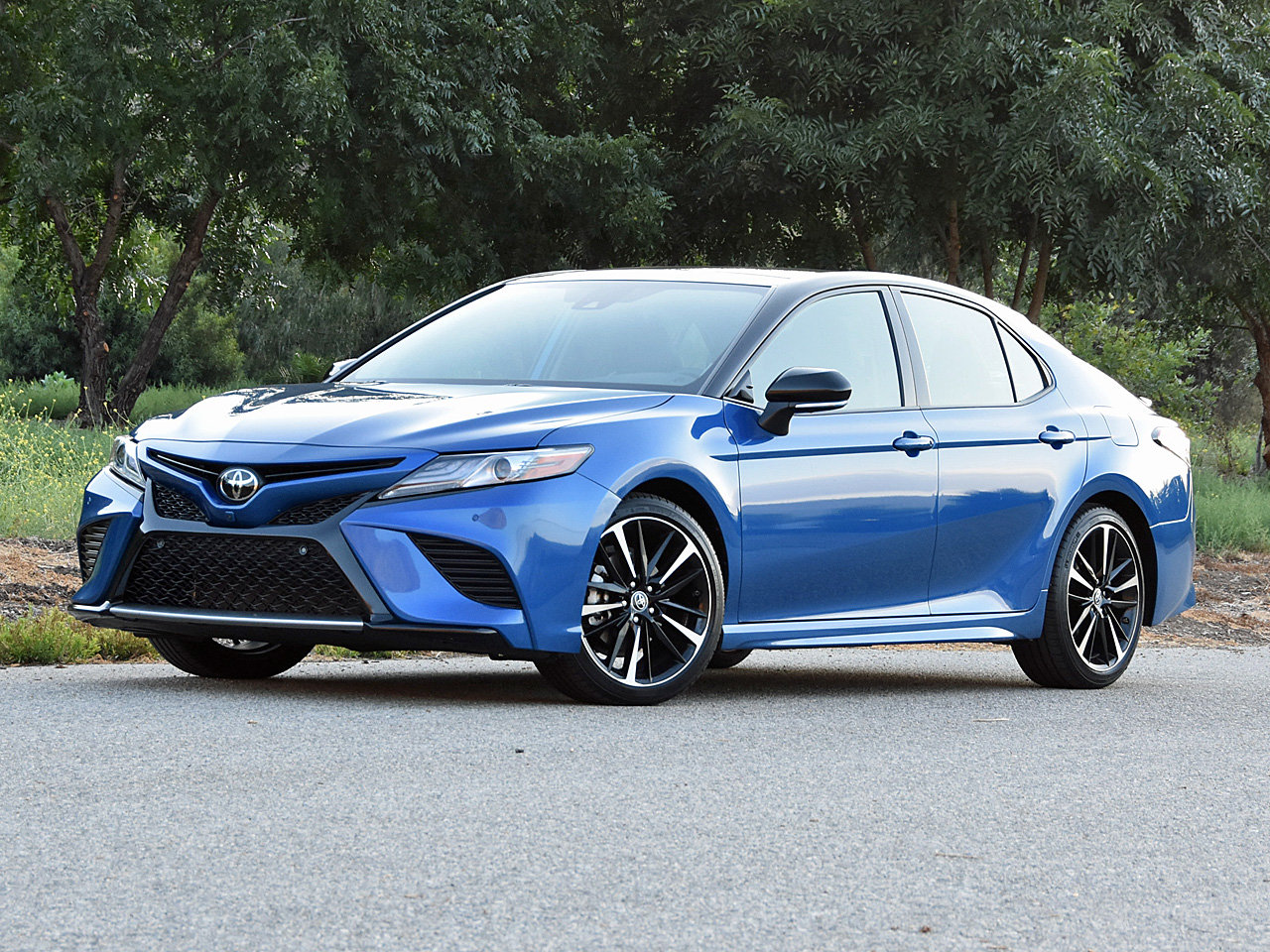
According to CarGurus experts, the overall rating for the 2019 Toyota Camry is 7.8 out of 10, while the 2020 Toyota Prius scores 7.5 out of 10. Based on these ratings, the 2019 Toyota Camry is the recommended choice, offering a more powerful engine option, superior safety ratings, and a comfortable driving experience.
Choose the 2019 Toyota Camry if:
- You prioritize a powerful engine option with the V6 for a more thrilling driving experience.
- You value top-tier safety ratings and a comprehensive suite of standard safety features.
- You prefer a traditional sedan design with a focus on driving comfort and quality materials.
Choose the 2020 Toyota Prius if:
- You seek excellent fuel efficiency and a seamless hybrid driving experience.
- You need a spacious and versatile interior with ample cargo space for various needs.
- You appreciate advanced technology features, including a large touchscreen and comprehensive connectivity options.
CarGurus highlights

According to CarGurus experts, the overall rating for the 2019 Toyota Camry is 7.8 out of 10, while the 2020 Toyota Prius scores 7.5 out of 10. Based on these ratings, the 2019 Toyota Camry is the recommended choice, offering a more powerful engine option, superior safety ratings, and a comfortable driving experience.
Choose the 2019 Toyota Camry if:
Shop Now- You prioritize a powerful engine option with the V6 for a more thrilling driving experience.
- You value top-tier safety ratings and a comprehensive suite of standard safety features.
- You prefer a traditional sedan design with a focus on driving comfort and quality materials.
Choose the 2020 Toyota Prius if:
Shop Now- You seek excellent fuel efficiency and a seamless hybrid driving experience.
- You need a spacious and versatile interior with ample cargo space for various needs.
- You appreciate advanced technology features, including a large touchscreen and comprehensive connectivity options.

By: CarGurus + AI
At CarGurus, our team of experienced automotive writers remain at the heart of our content operation, conducting hands-on car tests and writing insightful guides that are backed by years of industry experience. To complement this, we are harnessing AI to make our content offering more diverse and more helpful to shoppers than ever. To achieve this, our AI systems are based exclusively on CarGurus content, ratings and data, so that what we produce is both unique to CarGurus, and uniquely helpful to car shoppers.





